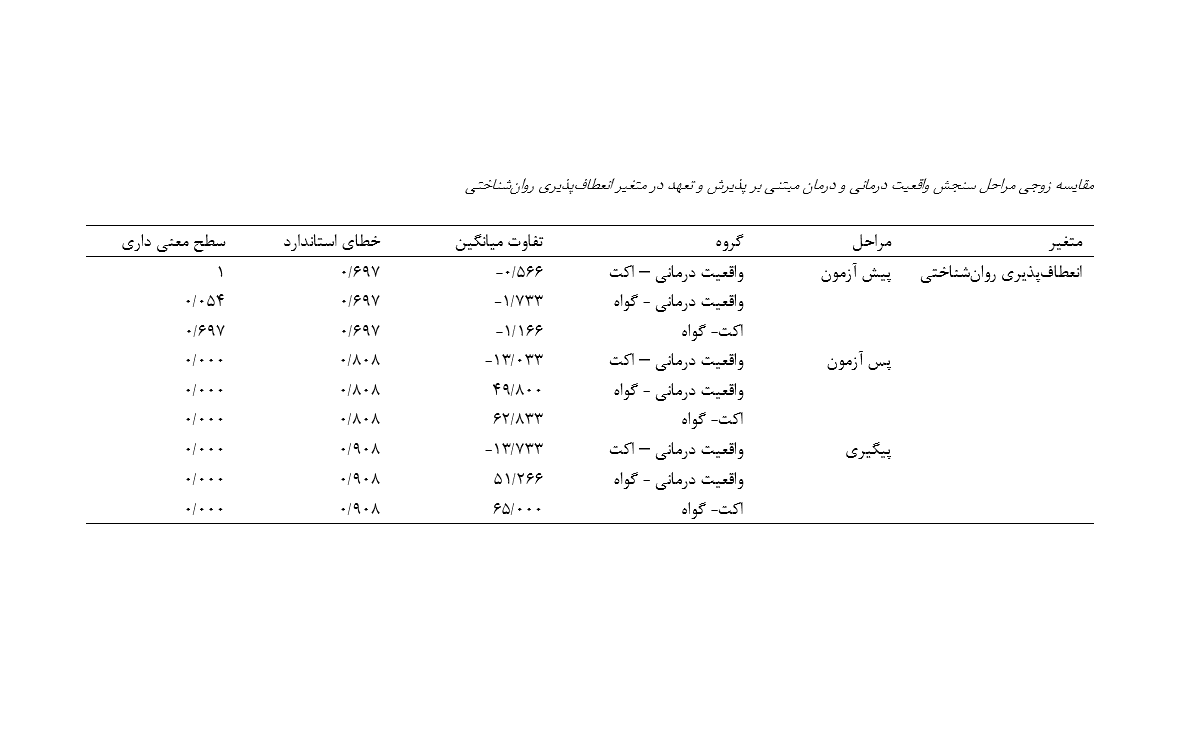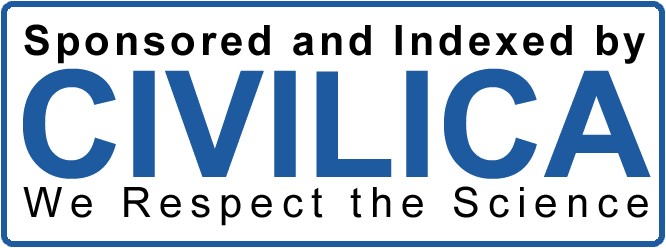Determining the Effectiveness of Reality Therapy and Acceptance and Commitment Therapy on Psychological Flexibility and Social Adjustment in Older Adults Attending Day Rehabilitation Centers in Tehran
Keywords:
psychological flexibility, acceptance and commitment therapy, social adjustment, older adults, reality therapyAbstract
The aim of the present study was to determine the effectiveness of Reality Therapy and Acceptance and Commitment Therapy (ACT) on psychological flexibility and social adjustment in older adults attending day rehabilitation centers in Tehran. The research method was quasi-experimental with a pretest-posttest-follow-up design and a control group. The statistical population of this study included all older adults attending day rehabilitation centers in Tehran in the first half of 2024, among whom 90 individuals were selected using purposive sampling according to the inclusion and exclusion criteria. They were randomly and by lottery assigned into three groups of 30: two experimental groups (Reality Therapy and ACT) and one control group. Participants responded to the Cognitive Flexibility Inventory (Dennis & Vander Wal, 2010) and the short version of Bell’s Adjustment Inventory (Bell, 1939) in pretest, posttest, and follow-up phases. The Reality Therapy protocol was based on Glasser’s (2003) principles of Reality Therapy and was conducted in eight 90-minute sessions over two months. The ACT protocol was based on the principles of Acceptance and Commitment Therapy by Hayes et al. (2012) and was also conducted in eight 90-minute sessions over two months. Data were analyzed using repeated measures analysis of variance. The results showed that in both posttest and follow-up phases, there was a significant difference between the Reality Therapy and ACT groups compared to the control group (P < .05), indicating the impact of both treatments on improving psychological flexibility and social adjustment. Furthermore, in both posttest and follow-up phases, there was a significant difference between the two experimental groups (P < .05), with mean comparisons showing that ACT was more effective in increasing psychological flexibility. In both posttest and follow-up phases, there was also a significant difference between the two groups (P < .05), with mean comparisons showing that Reality Therapy was more effective in improving social adjustment.
References
Behzadi, S., Tajeri, B., Sodagar, S., & Shariati, Z. (2021). The comparison of the effectiveness of acceptance, commitment, and reality therapy on life satisfaction and self-care behaviors of the elderly with type II diabetes. Applied Family Therapy Journal (AFTJ), 2(4), 483-501. https://journals.kmanpub.com/index.php/aftj/article/view/827
Bell, H. M. (1939). The theory and practice of personal counseling: With special reference to the Adjustment Inventory. Stanford University Press. https://books.google.de/books/about/The_Theory_and_Practice_of_Personal_Coun.html?id=4z07AAAAIAAJ&redir_esc=y
Bowins, B. (2021). Chapter 11 - Acceptance and commitment therapy. In B. Bowins (Ed.), States and Processes for Mental Health (pp. 107-114). Academic Press. https://doi.org/https://doi.org/10.1016/B978-0-323-85049-0.00011-8
Chan, F., Da Silva Cardoso E, Chronister JA. (2009). Understanding Psychosocial Adjustment to Chronic Illness and Disability: A Handbook for Evidence-Based Practitioners in Rehabilitation. Springer Publishing Company.
Chin, F., & Hayes, S. C. (2017). Chapter 7 - Acceptance and Commitment Therapy and the Cognitive Behavioral Tradition: Assumptions, Model, Methods, and Outcomes. In S. G. Hofmann & G. J. G. Asmundson (Eds.), The Science of Cognitive Behavioral Therapy (pp. 155-173). Academic Press. https://doi.org/https://doi.org/10.1016/B978-0-12-803457-6.00007-6
Curto, E., Crespo-Lessmann, A., González-Gutiérrez, M. V., Bardagí, S., Cañete, C., Pellicer, C., Bazús, T., Vennera, M. d. C., Martínez, C., & Plaza, V. (2019). Is asthma in the elderly different? Functional and clinical characteristics of asthma in individuals aged 65 years and older. Asthma Research and Practice, 5(1), 2. https://doi.org/10.1186/s40733-019-0049-x
Dajani, D. R., & Uddin, L. Q. (2015). Demystifying cognitive flexibility: Implications for clinical and developmental neuroscience. Trends in Neurosciences, 38(9), 571-578. https://doi.org/10.1016/j.tins.2015.07.003
de Almeida Roediger, M., de Fátima Nunes Marucci, M., Duim, E. L., Santos, J. L. F., de Oliveira Duarte, Y. A., & de Oliveira, C. (2019). Inflammation and quality of life in later life: findings from the health, well-being and aging study (SABE). Health and Quality of Life Outcomes, 17(1), 26. https://doi.org/10.1186/s12955-019-1092-2
Dennis, J. P., Vander Wal, Jillon S. (2010). The Cognitive Flexibility Inventory: Instrument Development and Estimates of Reliability and Validity. Cognitive therapy and research, 34(3), 241-253. https://doi.org/10.1007/s10608-009-9276-4
Emamdoost, Z., Teimory, S., Khoynezhad, G. R., & Rajaei, A. R. (2020). Comparison of effectiveness of mindfulness based cognitive therapy and reality therapy in attitudes of parents toward their children in mothers of children with Autism spectrum disorders. medical journal of mashhad university of medical sciences, 62(5.1), 722-731. https://doi.org/10.22038/mjms.2020.15582
Entezari, M., Shamsipour Dehkordi, P., & Sahaf, R. (2018). Effect of Physical Activity on Cognitive Flexibility and Perfectionism in the Elderly [Research]. Salmand: Iranian Journal of Ageing, 12(4), 402-413. https://doi.org/10.21859/sija.12.4.402
Falletta-Cowden, N., & Hayes, S. C. (2022). 6.03 - Acceptance and Commitment Therapy: Applying Contextual Behavioral Science to the Therapeutic Process. In G. J. G. Asmundson (Ed.), Comprehensive Clinical Psychology (Second Edition) (pp. 34-57). Elsevier. https://doi.org/https://doi.org/10.1016/B978-0-12-818697-8.00173-4
Fotoukian, Z., Mohammadi Shahboulaghi, F., & Fallahi Khoshknab, M. (2013). Analytical on empowerment interventions in older people with chronic disease: A review literature [Research]. Journal of Health Promotion Management, 2(4), 65-76. http://jhpm.ir/article-1-239-fa.html
Ghiasabadi Farahani, E., Jafari Harandi R. (2021). Predict cognitive flexibility through social adjustment and responsibility among female students. Social Psychology Research, 10(40), 135-150. https://doi.org/10.22034/spr.2021.127718
Glasser, C. (2019). A choice theory psychology guide to happiness: How to make yourself happy (the choice theory in action series). In. Independently published.
Glasser, W. (2001). Counseling with Choice Theory. Harper Perennial. https://books.google.ch/books/about/Counseling_with_Choice_Theory.html?id=8pgapP2X9_AC&redir_esc=y
Glasser, W. (2003). For Parents and Teenagers: Dissolving the Barrier Between You and Your Teen. Harper Perennial. https://books.google.ch/books/about/For_Parents_and_Teenagers.html?id=av_HzgEACAAJ&redir_esc=y
Glasser, W. (2013). Take charge of your life: How to get what you need with Choice Theory Psychology. IUniverse Publishing.
Habibi, K., Alimohammadzadeh, K., & Hojjati, H. (2018). The effect of group reality therapy on the coping of spouses of veterans with post-traumatic stress disorder [Research]. Journal of Health Promotion Management, 6(6), 1-7. https://doi.org/10.21859/jhpm-07041
Hayes, S. C., Strosahl K, Wilson KG. (2012). Acceptance and commitment therapy: The process and practice of mindful change. Guilford Press.
Hoffmann, D., Rask, C. U., & Frostholm, L. (2019). Chapter Seven - Acceptance and Commitment Therapy for Health Anxiety. In E. Hedman-Lagerlöf (Ed.), The Clinician's Guide to Treating Health Anxiety (pp. 123-142). Academic Press. https://doi.org/https://doi.org/10.1016/B978-0-12-811806-1.00007-X
Hsu, T., Adamowicz, J. L., & Thomas, E. B. K. (2023). The effect of acceptance and commitment therapy on the psychological flexibility and inflexibility of undergraduate students: A systematic review and three-level meta-analysis. Journal of Contextual Behavioral Science, 30(1), 169-180. https://doi.org/10.1016/j.jcbs.2023.10.006
Klimczak, K. S., & Levin, M. E. (2023). Acceptance and commitment therapy. In H. S. Friedman & C. H. Markey (Eds.), Encyclopedia of Mental Health (Third Edition) (pp. 1-9). Academic Press. https://doi.org/https://doi.org/10.1016/B978-0-323-91497-0.00121-1
Kohandani, M., & Abolmaali Alhosseini, K. (2017). Factor structure and psychometric properties of Persian version of cognitive flexibility of Dennis, Vander Wal and Jillon. Psychological Models and Methods, 8(29), 53-70. https://jpmm.marvdasht.iau.ir/article_2556_1b01501fd8b120f22c11d43af7c41f2d.pdf
Lennon, B. (2019). A Choice Theory Psychology Guide to Stress: Ways of Managing Stress in Your Life. Independently published. https://books.google.ch/books/about/A_Choice_Theory_Psychology_Guide_to_Stre.html?id=Ld_ZxQEACAAJ&redir_esc=y
Mazaheri Tehrani, F., Kokali, M., Savabi Niri, V., & Bikas Yekani, M. (2022). The Effectiveness of Reality Therapy on Cognitive Flexibility and Self-Differentiation in Mothers with Children with Special Learning Disorders [Research]. Quarterly Journal of Child Mental Health, 9(1), 84-99. https://doi.org/10.52547/jcmh.9.1.7
Moini, J., Akinso, O., Ferdowsi, K., & Moini, M. (2023). Chapter 8 - Elderly health. In J. Moini, O. Akinso, K. Ferdowsi, & M. Moini (Eds.), Health Care Today in the United States (pp. 171-191). Academic Press. https://doi.org/https://doi.org/10.1016/B978-0-323-99038-7.00028-X
Mottaghi, R., Maredpour, A., & Karamin, S. (2022). A Comparison Study on the Effectiveness of Acceptance and Commitment Therapy and Sleep Hygiene Education on Sleep Quality and Physiological Parameters in Older Adults [Research]. Salmand: Iranian Journal of Ageing, 17(2), 170-185. https://doi.org/10.32598/sija.2022.1438.3
Navarro, M. C., Quiroz Molinares, N., & Mebarak, M. (2022). Psychometric Study of the Cognitive Flexibility Inventory in a Colombian Sample. International Journal of Psychological Research, 15(1), 42-54. https://doi.org/10.21500/20112084.5371
Oraki, M., Jahani F, Rahmanian M. (2018). The effectiveness of acceptance and commitment therapy (ACT) on the psychological flexibility of the elderly women. Journal of Clinical Psychology, 10(1), 47-56. https://doi.org/10.22075/jcp.2018.14182.1378
Ota, M., Takeda, S., Pu, S., Matsumura, H., Araki, T., Hosoda, N., Yamamoto, Y., Sakakihara, A., & Kaneko, K. (2020). The relationship between cognitive distortion, depressive symptoms, and social adaptation: A survey in Japan. Journal of affective disorders, 265, 453-459. https://doi.org/10.1016/j.jad.2020.01.094
Pruchno, R. (2021). Chapter 19 - Successful Aging: An Obscure but Obvious Construct. In K. W. Schaie & S. L. Willis (Eds.), Handbook of the Psychology of Aging (Ninth Edition) (pp. 301-318). Academic Press. https://doi.org/https://doi.org/10.1016/B978-0-12-816094-7.00008-8
Ram, D., Chandran, S., Sadar, A., & Gowdappa, B. (2019). Correlation of Cognitive Resilience, Cognitive Flexibility and Impulsivity in Attempted Suicide. Indian J Psychol Med, 41(4), 362-367. https://doi.org/10.4103/ijpsym.Ijpsym_189_18
Robey, P., Burdenski, T. K., Britzman, M., Crowell, J., & Cisse, G. S. (2011). Systemic Applications of Choice Theory and Reality Therapy: An Interview With Glasser Scholars. The Family Journal, 19(4), 427-433. https://doi.org/10.1177/1066480711415038
Sepas, L., Shaker Dioulag A, Khademi A. (2022). Comparison of the effectiveness of acceptance-based therapy and reality therapy on reducing anxiety sensitivity in women with MS in Urmia. Counseling Culture and Psycotherapy, 13(51), 85-113. https://doi.org/10.22054/qccpc.2022.64043.2808
Shareh, H., Farmani A, Soltani E. (2014). Investigating the reliability and validity of the Cognitive Flexibility Inventory (CFI-I) among Iranian university students. Practice in Clinical Psychology, 2(1), 43-50.
Shishefar, S., Kazemi F, Pezeshk Sh. (2017). The effectiveness of reality therapy training to increase happiness and responsibility in the mothers of children with Autism disorder. Psychology of Exceptional Individuals, 7(27), 53-77. https://doi.org/10.22054/jpe.2018.18761.1487
Strosahl, K. (2002). Acceptance and Commitment Therapy. In M. Hersen & W. Sledge (Eds.), Encyclopedia of Psychotherapy (pp. 1-8). Academic Press. https://doi.org/https://doi.org/10.1016/B0-12-343010-0/00001-5
Tootak, M., & Abedanzadeh, R. (2021). Effectiveness of brain gym exercise on cognitive flexibility of male elderly [Research]. Advances in Cognitive Sciences, 22(4), 65-74. https://doi.org/10.30514/icss.22.4.65
Torkaman, M., Miri, S., & Farokhzadian, J. (2018). Relationship between adaptation and self-esteem in addicted female prisoners in the south east of Iran. International Journal of Adolescent Medicine and Health, 32(4), 1-10. https://doi.org/10.1515/ijamh-2017-0168
Whittingham, K., & Coyne, L. W. (2019). Chapter 14 - Integrating Acceptance and Commitment Therapy with other interventions. In K. Whittingham & L. W. Coyne (Eds.), Acceptance and Commitment Therapy (pp. 377-402). Academic Press. https://doi.org/https://doi.org/10.1016/B978-0-12-814669-9.00014-X
Wubbolding, R. E. (2012). Reality Therapy (Theories of Psychotherapy) (1st ed.). American Psychological Association.
Zandi, A., Dinpanah-Khoshdarehgi, H., Ebrahim-Madahi, M., & Jamehri, F. (2023). Comparison of the effect of acceptance and commitment therapy and reality therapy on the self-care of diabetes type II patients. J Educ Health Promot, 12, 364. https://doi.org/10.4103/jehp.jehp_1174_22

Downloads
Published
Submitted
Revised
Accepted
Issue
Section
License

This work is licensed under a Creative Commons Attribution-NonCommercial 4.0 International License.









